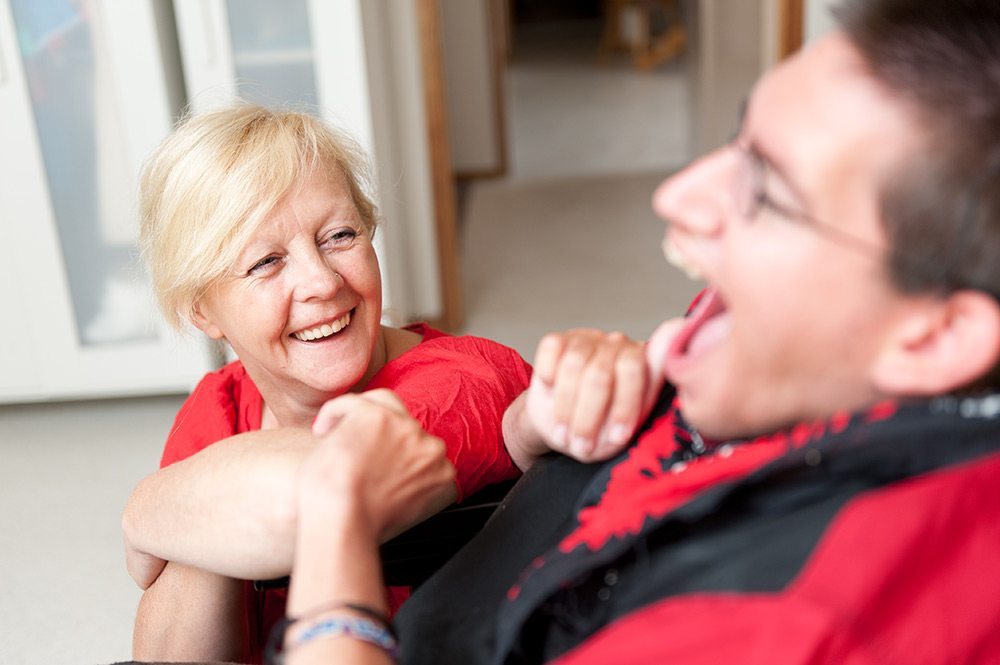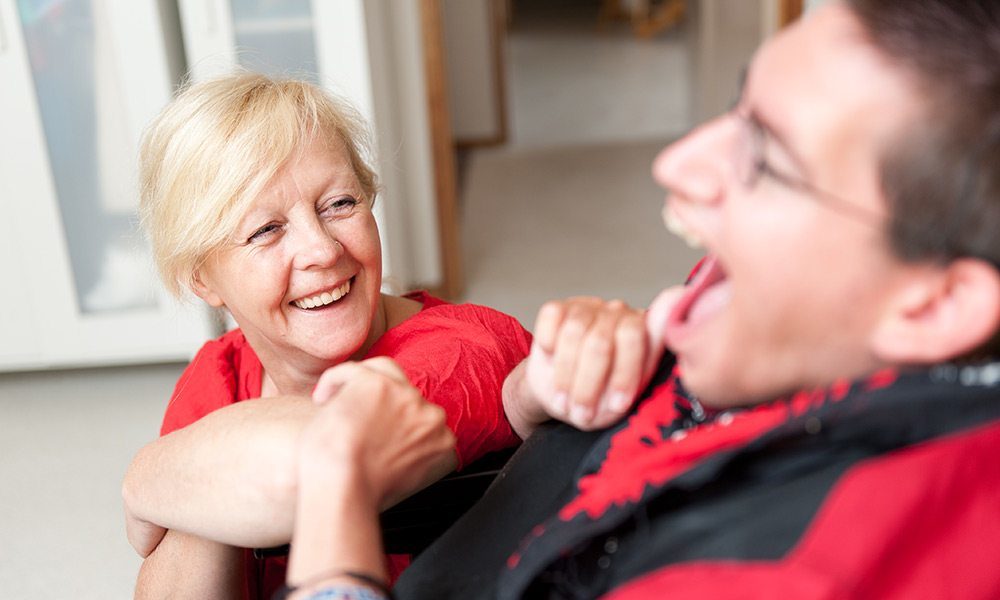Parents often require assistance in caring for their child with disabilities, especially as the both parents and child begin to age. In many cases, parents can secure help (in the form of home care services or personal care assistance) by utilizing certain Medicaid waivers. In cases where parents have pursued a medical malpractice or birth injury lawsuit, life care plans produced as part of the suit often take into account the need for personal care assistance or home care. If the family wins the suit, the funds from the suit go towards securing personal care and assistance for their child with disabilities.
Jump to:
- Benefits of home care
- Challenges of finding qualified staff
- Partnering with your child’s therapists
- Paying for personal care staff and assistance
Benefits of home care
 The care of a child with disabilities can require different adaptations in the home. Sometimes, this means the provision of a trained professional to assist in the tasks of daily living, providing medical care, and providing medical services if necessary. In many cases, families prefer to care for their children within the home environment because it allows them to provide a controlled, safe and happy environment that the child is familiar and comfortable with.
The care of a child with disabilities can require different adaptations in the home. Sometimes, this means the provision of a trained professional to assist in the tasks of daily living, providing medical care, and providing medical services if necessary. In many cases, families prefer to care for their children within the home environment because it allows them to provide a controlled, safe and happy environment that the child is familiar and comfortable with.
Challenges of finding qualified staff
Because some children with HIE have complex health needs, it is important to find a qualified professional well-versed in assisting children with disabilities. Depending on the level of home care needed, and the type of staff parents are looking for, the certification and qualification process for home care differs. Parents should be aware of the different types of professionals that can help their child, as small differences in licensure can change what they are qualified and trained to do:
Personal Care Aides (PCAs) / Home Helpers / Non-certified Aides
Personal care aides and other assistants may not necessarily have a certification or license, though (depending on individual state regulations), some may. These aides generally are not trained in providing medical care, though they can assist with custodial, supportive and long-term care services like cleaning, cooking, running errands, and companionship, as well as personal care services such as bathing, grooming and ambulation. Often, these are private duty hires or are part of non-medical home care agencies.
Other names for PCAs may include:
- Private Duty Home Care
- Non-Medical Home Care
- Custodial Care
- Personal Care
- Companion Care
Home Health Aides (HHAs)
Depending on the state, HHA certifications can vary. Often, HHA certification is taken as part of a CNA course. Home Health Aides can help individuals do the activities of daily living, such as:
- Bathing
- Dressing
- Toileting
- Assisting in changing simple dressing
- Taking vital signs
The key difference between an HHA and a PCA is that HHAs provide medically-focused care, while PCAs do not. Sometimes HHAs are covered by insurance.
Certified Nursing Assistants (CNAs)
CNAs go through state-approved training, which includes HHA training. In addition to the work provided by a PCA or an HHA, CNAs can assist in medical-related tasks under the supervision of a nurse (an RN or nurse practitioner, or NP). These tasks can include setting up medical equipment, observing patients, cleaning catheters, controlling infections and administering certain needed treatments.
Licensed Practical Nurses (LPNs)/ Licensed Vocational Nurses (LVNs)
This nursing staff classification provides basic medical and nursing care. This can include checking blood pressure, changing catheters, reporting health changes to supervisory staff, and similar tasks. Usually, LPNs and LVNs have one year of training and a certificate. These staffers report to an RN or other highly-certified medical staffer.
Registered Nurses (RNS)
Registered nurses have a two-to-three year degree as well as a nursing diploma. These individuals often supervise the care provided by individuals with less training, such as LPNs.
For more detailed information regarding types of home caregivers, please visit the Care Pathways website.
Partnering with your child’s other therapists
It is also important to note that a child’s home health care plan may include the participation of other staff, such as:
- Physical Therapists (PTs)
- Occupational Therapists (OTs)
- Speech Therapists (ST)
- Social Workers
- Medical Social Workers (MSW)
- Registered dietitians
- Behavioral psychologists
- Individuals skilled in servicing respirators, feeding tubes, catheters or drug infusion machines
Such specialized staff do not provide full-time care but can provide services as needed regarding their specific areas of expertise.
Choosing personal care staff for your disabled child
Choosing a personal care or home health staffer can be a difficult choice because their degree and educational background are not the only things that parents need to consider. Investigations regarding the care worker’s history need to be conducted. Some agencies will screen their staff with background checks, while others do not. Parents can also set up a meet and greet with a potential staffer to see how they interact with their child.
Furthermore, the kind of care that a child needs can vary significantly. For some families whose child’s diagnosis may be less severe, a personal care assistant and a weekly nurse visit may be sufficient, while in other cases, 24-hour care or day care services may be needed.
Use an agency or locate local resources on your own
In some cases, parents seek out personal care via agencies that conduct screenings and evaluations to help determine how much help a child needs and which services are necessary for their optimal functioning.
In the case of parents seeking help outside of an agency, there are several trade organizations they can work with to find resources in their local area. A good place to start can be by familiarizing yourself with both the National Association for Home Care & Hospice and the Home Care Association of America. Most states have their own ‘Home Care Association,’ such as the:
A full list of state home health associations is provided by the Accreditation Commission for Health Care website. Though names may vary, these organizations often:
- Maintain databases of accredited providers and
- Have people on staff to assist parents in finding local, qualified providers
Verify any potential providers’ qualifications
Parents can often request references and conduct interviews of candidates themselves, and request that candidate provide evidence of their credentials and certifications (such as certification through the National Association of Home Care & Hospice, which requires 75 hours of training and the successful completion of a written exam).
Paying for personal care staff and assistance
Parents often wonder how they’ll afford personal or medical care for their child. If a child receives Medicaid, their home health assistance may be covered, to an extent, by Medicaid waivers. Waivers can include 1915(c) Home and Community-Based Waiver or the Personal Care Assistance Medicaid Waiver Program. How much will be covered depends on the individual state. Private insurance sometimes covers home health services, though individuals will have to check with their insurers regarding how much will be covered.
Sometimes, charities, nonprofit organizations or certain care foundations provide limited grant assistance to individuals caring for children or adults with disabilities. However, these grants are usually designed for limited short-term care, rather than as a long-term solution.

